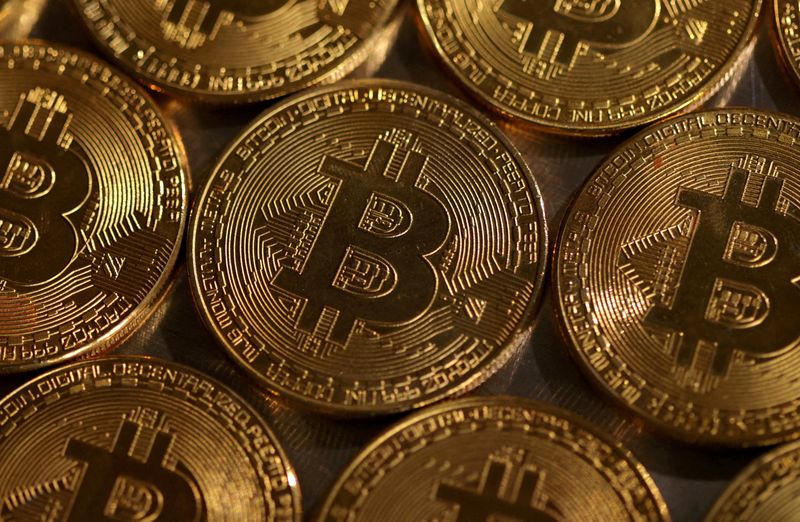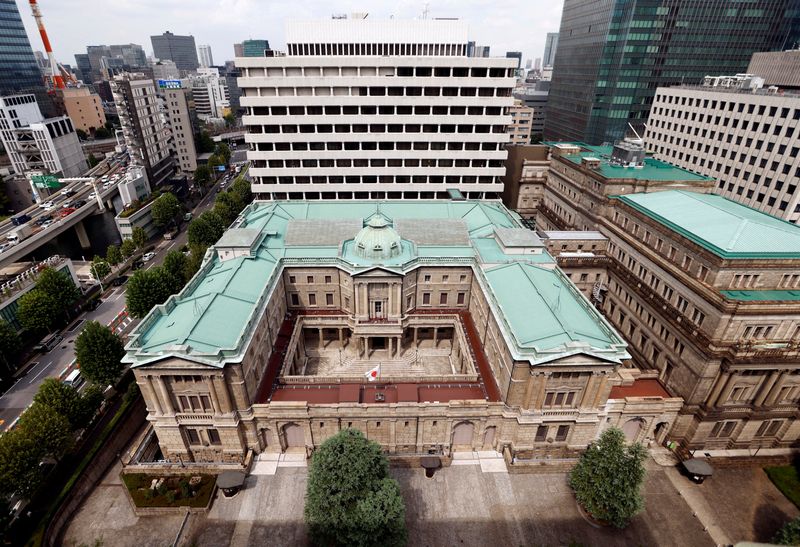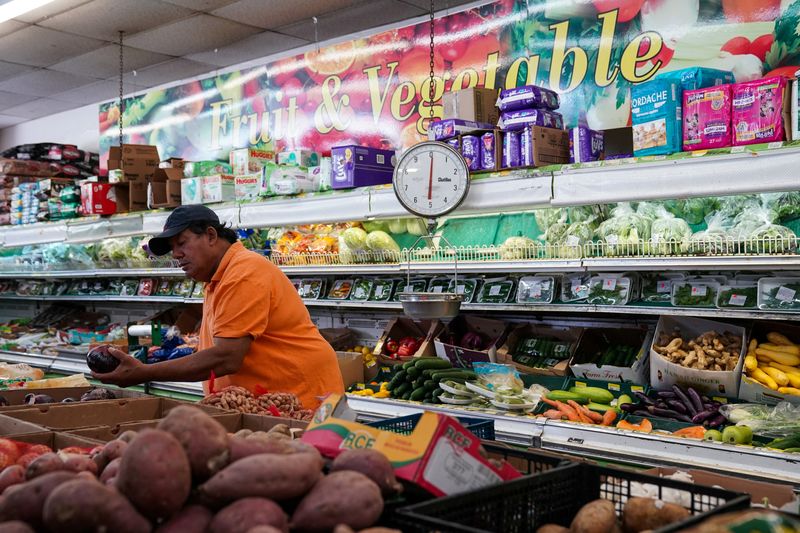Select Language

BEIJING (Reuters) -China's factory output and retail sales beat expectations in the January-February period, marking a solid start for 2024 and offering some relief to policymakers even as weakness in the property sector remains a drag on the economy and confidence.
Industrial output rose 7.0% in the first two months of the year, data released by the National Bureau of Statistics (NBS) showed on Monday, above expectations for a 5.0% increase in a Reuters poll of analysts and faster than the 6.8% growth seen in December. It also marked the quickest growth in almost two years.
Retail sales, a gauge of consumption, rose 5.5%, slowing from a 7.4% increase in December. Analysts had expected retail sales to grow 5.2%.
The eight-day Lunar New Year holiday in February saw a solid return of travel, which supported revenue of tourism and hospitality sectors.
"China’s activity data broadly stabilised at the start of the year. But there are still reasons to think some of the strength could be one-off," Louise Loo, China economist at Oxford Economics.
"Consumers were buoyed temporarily by festivities-related spending at this start of the year. In the absence of decisive consumption-related stimulus this year, we think it would be difficult to sustain a robust consumer spending pace this year."
Fixed asset investment expanded 4.2% in the first two months of 2024 from the same period a year earlier, versus expectations for a 3.2% rise. It grew 3.0% in the whole of 2023.
Notably, private investment grew 0.4% in the first two months, reversing the decline of 0.4% in the whole year of 2023.
Together with better-than-expected trade data and consumer inflation, Monday's indicators will provide some temporary encouragement for policymakers as they try to shore up growth in the world's second-largest economy to keep it on track for an expansion of around 5% this year.
PROPERTY PAINS
But analysts say achieving such growth would be more challenging than last year, which had a lower base effect due to COVID curbs in 2022. Moreover, the property sector remains weak and could continue to be a major impediment to a solid recovery this year.
Zhiwei Zhang, chief economist at Pinpoint Asset Management, said the economic outlook in the second quarter remains uncertain, noting that property sales "plummeted" while the unemployment rate rose.
Property investment slid 9.0% year-on-year in January-February, compared with a 24.0% fall in December but still far from levels of reaching stability.
The frailty of the sector was highlighted by the poor sales. Property sales by floor area logged a 20.5% slide in January-February from a year earlier, compared with a 23.0% fall in December last year.
The job market worsened with the nationwide survey-based jobless rate at 5.3% in January-February, up from 5.1% in December.
The NBS publishes combined January and February industrial output and retail sales data to smooth out distortions caused by the shifting timing of the Lunar New Year. Activity picked up in the first two months of 2023 as COVID curbs were lifted, which may create a less flattering base effect for this year's data.
Premier Li Qiang promised at the annual parliamentary meeting earlier this month to transform the country's growth model and defuse risks in the property sector and local government debt.
China plans to issue 1 trillion yuan in special ultra-long term treasury bonds to support some key sectors and set a higher quota for local government special bond issuance this year.
The country's central bank governor Pan Gongsheng also said at a press conference on March 6 that there was still room to cut banks' reserve ratio requirement (RRR), following a 50-basis points cut announced in January, which was the biggest in two years.
Global monetary easing expectations may also offer some relief for China's hopes of strengthening its vast manufacturing sector although economic conditions in many key developed nations look gloomy over the near term. Britain slipped into a recession in the second half of last year, while Japan and the euro zone have shown meager growth.
Policymakers have pledged to roll out further measures to help stabilise growth after the steps implemented since June had only a modest effect, but analysts caution Beijing's fiscal capacity is now very limited and note Li's address to the annual parliamentary meeting failed to inspire investor confidence.
Many economists say there is a risk that China may begin flirting with Japan-style stagnation later this decade unless authorities take steps to reorient the economy towards household consumption and market-allocation of resources.

By Jamie McGeever
(Reuters) - A look at the day ahead in Asian markets.
A batch of top-tier Chinese economic data releases gets Asian markets underway on Monday, with sentiment pretty fragile after last week's global market wobble and as investors brace for U.S. and Japanese policy decisions later in the week.
Asian equity markets are on the defensive. The MSCI Asia ex-Japan index's 1.4% slump on Friday - its steepest since January - sealed its biggest weekly loss in two months, while Japan's Nikkei 225 lost 2.5% for its biggest weekly loss this year.
The sharp rebound in U.S. bond yields is taking its toll on risk appetite, and was probably the main catalyst for the selloff in global stocks last week.
The ICE BofA U.S. Treasuries index fell every day last week, its worst run since August resulting in the biggest weekly fall since October. The two-year yield rose 24 basis points, almost the equivalent of a quarter-point rate hike.
The Asia and Pacific calendar this week is packed with hugely important economic data releases and central bank policy meetings, none more so than the Bank of Japan's two-day meeting that starts on Monday.
Expectations are high that the BOJ will raise interest rates for the first time since 2007, bringing the curtain down on eight years of 'negative interest rate policy', or NIRP.
Japan's biggest companies agreed to raise wages by 5.28% for 2024, the heftiest pay hikes in 33 years, the country's largest union group said on Friday, reinforcing views that policymakers will make their historic move on Tuesday.
Sources have also told Reuters that the BOJ will offer guidance on how much government bonds it will buy upon ending NIRP and yield curve control (YCC), to avoid causing market disruptions.
Policy decisions from the central banks of China, Australia, Indonesia and Taiwan are also on tap this week, as are inflation figures from Japan and New Zealand's fourth-quarter GDP report.
The week kicks off on Monday, though, with four key indicators from China - business investment, retail sales, industrial production and unemployment.
Some green shoots of recovery in China are gradually becoming visible. There are signs that capital is no longer flooding out the country, stocks have recovered, and some economic data is improving - China's economic surprises index is the highest since October.
But the road to recovery will be long and rocky. Figures last week showed that house prices fell at their fastest annual rate in over a year, and new bank lending growth fell to the lowest on record.
Figures on Monday are expected to show that business investment growth in February ticked up to 3.2%, industrial output growth slowed to 5.0% and retail sales also slowed to 5.2% from the month before. These are all year-on-year measures.
Here are key developments that could provide more direction to markets on Monday:
- China 'data dump' (February)
- Japan machinery orders (January)
- Malaysia trade (February)
(By Jamie McGeever; Editing by Aurora Ellis)

Investing.com -- Central bank decisions will be front and center in what’s set to be an action-packed week as investors attempt to gauge how close the Federal Reserve is to cutting rates. The Bank of Japan appears to be shaping up to exit negative interest rates after months of anticipation. Meanwhile, AI darling Nvidia (NASDAQ:NVDA) is to hold a closely watched developer conference. Here’s what you need to know to start your week.
Federal Reserve meeting
Last week’s hotter-than-expected U.S. producer and consumer price data prompted traders to rein in bets on future cuts from the Fed.
All eyes are now on Wednesday’s Fed meeting and any clues on the central bank's outlook for rate cuts, the resilience of the U.S. economy and the possibility of an inflationary rebound.
Earlier this month Fed Chair Jerome Powell said officials have “gained greater confidence that inflation is moving sustainably” toward the central bank’s 2% goal but added that they want more evidence that inflation is slowing before they begin easing.
“We think that the Fed is still likely to ease at mid-year (June or July), but the FOMC meeting will keep us squarely in the wait-and-see period by another one or two meeting cycles, with Jay Powell repeating that he needs a “little bit more” evidence that disinflation is sustainable before he would cut the Fed Funds rate target” analysts at Macquarie said in a note.
BOJ
Tuesday’s BOJ meeting could be one of the most consequential in years with officials set to decide whether to end eight years of negative interest rates in what would mark a landmark shift away from its huge stimulus program.
Japan’s Nikkei newspaper reported Saturday that the BOJ is expected to end its negative interest rate policy this week after the countries biggest companies agreed with labour unions to raise wages by the largest amount in 33 years in annual wage negotiations.
The BOJ began coordinating both within and outside the bank Friday on ending its negative interest rate policy, the report said.
With an end to negative rates seen as nearly a done deal, the market's attention is shifting to any clues the BOJ could give on the pace of any interest rate hikes thereafter.
Bank of England
The BoE will likely play for time in Thursday's rate announcement as it awaits greater clarity on wage growth, which remains stronger than in the U.S. or the euro zone.
Markets are currently expecting the BoE to start cutting borrowing costs from 5.25% - the highest since 2008 - in August, after both the Fed and the European Central Bank.
Investors will be on the lookout for any change in language about putting the BoE's Bank Rate "under review" and any shift in the balance of votes after February's three-ways split. And Wednesday's inflation reading could cause a last-minute rethink.
Nvidia developer conference
The Nvidia GTC developer conference due to get underway on Monday will be watched closely for AI-related announcements with investors undoubtedly keen to hear announcements that will sustain the mammoth rally in its stock.
CEO Jensen Huang will deliver the keynote address and may offer attendees a first look at its newest products, including its next generation B100 GPU for AI and high-performance computing applications.
Nvidia’s gains for the year to date have already added $1 trillion to the company’s market valuation, catapulting it into a position as the top-performing stock in the S&P 500 Index, but the stock has seen some volatility since a record high close on March 7.
Oil prices
Oil prices dipped on Friday, a day after topping $85 a barrel for the first time since November, but prices finished more than 3% higher for the week on rising demand from U.S. refiners completing planned overhauls.
In the coming week energy traders will be looking to Wednesday’s Fed meeting as cuts in interest rates are seen as opportunity for demand growth in the United States.
Oil prices were boosted after the International Energy Agency on Thursday raised its view on 2024 oil demand for a fourth time since November as Houthi attacks have disrupted Red Sea shipping.
The gains came despite the U.S. dollar strengthening at its fastest pace in eight weeks. A stronger dollar makes crude more expensive for users of other currencies.
--Reuters contributed to this report

SINGAPORE (Reuters) - Bitcoin eased to a one-week low in volatile trade on Friday, as investors took profit from its run to a record high and as another upside surprise on U.S. inflation dimmed prospects of early rate cuts there and dented demand for riskier assets.
Bitcoin fell more than 5% in the Asian session to bottom at $66,629.96, before paring some of its losses to last trade 3.5% lower.
The choppy moves in the world's largest cryptocurrency came a day after its charge to a high of $73,803.25, setting a new record for a fourth straight day.
"Bitcoin has an established history of getting volatile and ruthless after hitting (a) record high," said Matt Simpson, senior market analyst at City Index.
"And not only did it recently hit a new high, but it looks like the (Federal Reserve) won't be as dovish as traders had hoped."
A slew of data out on Thursday showed that while U.S. retail sales rebounded less than expected in February, producer prices increased more than expected.
The releases came on the heels of U.S. consumer price data out earlier in the week that pointed to still-sticky inflationary pressures.
Markets reacted by paring the chances of a Fed easing cycle beginning in June, with futures now pointing to a roughly 60% chance of a rate cut that month, down from roughly 74% a week ago, according to the CME FedWatch tool.
A higher-for-longer rates scenario, particularly in the United States, is typically bad for risk-sensitive assets such as crypto.
Still, bitcoin remains nearly 60% higher for the year to date, helped by a crypto frenzy driven by flows into U.S. spot exchange-traded crypto products and as traders remain broadly focused on the prospect of global interest rates being lower by the year-end.
In a show of optimism over bitcoin's bull run, software firm MicroStrategy said it is planning to raise capital through a convertible bond offering to buy bitcoin for the second time in less than 10 days.
The company had on March 5 announced a $600 million private offering in convertible notes, as it looks to increase its exposure to the booming digital asset.
Some experts say the news also contributed to bitcoin's volatile moves on Friday.
"Unlike traditional stock markets, the crypto market lacks regulations that limit the impact of influential individuals or entities with concentrated holdings," said Joshua Chu, chief risk officer at Invess, an AI-enabled algo risk management financial engineering company.
"This absence allows whales to make substantial trades that can trigger cascading effects and rapid price fluctuations, leading to heightened volatility."
Elsewhere, ether, the second-largest cryptocurrency, similarly touched a one-week low, and was last down more than 4% to $3,670.

By Leika Kihara
TOKYO (Reuters) - The Bank of Japan is close to ending eight years of negative interest rate policy, with expected historical wage hikes heightening the prospect of a landmark shift away from its massive stimulus programme next week.
Internal preparations for an exit have been in the works since Kazuo Ueda took office as BOJ governor in April last year, and were mostly done by year-end, say sources familiar with the bank's thinking.
BOJ officials, including Ueda, have recently stressed the timing of a shift away from negative rates would depend on the outcome of this year's annual wage negotiations between workers and employers.
The bumper pay hikes offered by big firms like Toyota Motor (NYSE:TM) this month, the biggest in 25 years, are now seen clearing the way for the BOJ to phase out its massive stimulus.
If the board believes the conditions are right, the BOJ will set the overnight call rate as its new target and guide it in a range of 0-0.1% by paying 0.1% interest to excess reserves financial institutions park with the central bank.
The BOJ will likely make a final decision on whether to pull the trigger next week, or hold off until April, after scrutinising a preliminary survey of big firms' wage talk outcome to be released by labour umbrella Rengo later on Friday.
"If big firms are offering big pay hikes, it's highly likely that smaller firms will follow suit to some extent so they can hire enough staff," said Yoshiki Shinke, senior executive economist at Dai-ichi Life Research Institute.
"Rengo's survey due out on Friday will give the BOJ a big reason to end negative rates in March," he said.
Analysts expect Friday's Rengo survey to show wage increase of around 4.5% or even 5%, far above the 3.8% hike in a poll conducted a year ago, heightening hopes that rising pay will revive stagnant household spending and broader economic growth.
Upon exiting its negative rate policy, the BOJ will also ditch its bond yield control and discontinue purchases of risky assets such as exchange-traded funds (ETF), sources have told Reuters, putting a formal end to the radical monetary experiment of former Governor Haruhiko Kuroda in place since 2013.
A poll taken in March showed 35% of economists expect the BOJ to end negative rates at the two-day meeting ending on Tuesday, up from the previous month's 7% but still below 62% projecting such action at a subsequent meeting on April 25-26.
With an end to negative rates seen as nearly a done deal, the market's attention is shifting to any clues the BOJ could give on the pace of any interest rate hikes thereafter.
Ueda has said the central bank will maintain accommodative monetary conditions even after ending negative rates, and avoid causing any "discontinuity" from the current ultra-loose policy given uncertainty over the economic outlook.
Any guidance on the future policy path that the BOJ could offer upon ending negative rates will likely be in line with such comments, sources have told Reuters.
Under previous governor Kuroda, the BOJ deployed a huge asset-buying programme in 2013 to reflate growth and fire up inflation to its 2% inflation in roughly two years.
The central bank introduced negative rates and yield curve control (YCC) in 2016 as tepid inflation forced it to tweak its stimulus programme to a more sustainable one.
However, last year, as the yen's sharp falls pushed up the cost of imports and heightened public criticism over the cost of Japan's ultra-low interest rates, the BOJ tweaked YCC to relax its grip on long-term rates.
An end to negative short-term rates would be Japan's first interest rate hike since 2007.

By Alasdair Pal
SYDNEY (Reuters) - New Zealand will report "significantly slower" economic growth for the next few years when it releases a pre-Budget update in two weeks' time, Finance Minister Nicola Willis said on Friday, as slower productivity growth hampers the country's economy.
New Zealand's economy unexpectedly contracted in the third quarter and significant downward revisions were made to economic growth in earlier quarters, leading the market to pull back on bets of further interest rate hikes next year.
That, combined with recent data continuing to be weaker than forecast, has led Treasury officials to reassess growth projections for the economy, Willis said.
"The numbers haven’t been finalised, but I know enough to say they won’t make happy reading," Willis said, according to a copy of a speech to business leaders in Auckland on Friday.
"Treasury is now warning me that growth over the next few years is likely to be significantly slower than it had previously thought."
In December, New Zealand's Treasury forecast real annual GDP growth of 1.5% for the fiscal years ending June 2024 and 2025.
The weaker growth projections would not lead to cuts to government investment, Willis said.
Instead, the government plans to promote growth in several sectors, including space and biomedical engineering, alongside the country's traditional strengths of farming, fishing and tourism.
"With low-growth forecasts bearing down on New Zealand, now, more than ever, we must double-down on the drive for real economic growth," she said.
New Zealand will publish a Budget Policy Statement in two weeks' time, ahead of a Budget due on May 30.

By Gertrude Chavez-Dreyfuss
NEW YORK (Reuters) -The U.S. dollar advanced on Thursday, boosted by data showing hotter-than-expected producer prices last month and fewer people seeking unemployment claims, which suggested that the Federal Reserve could reduce the number of rate cuts this year.
The dollar index, which gauges the currency against six major peers, rose in three of the last four sessions. It was last up 0.6% at 103.36. For the week, the index was up 0.6%, on pace for its largest weekly gain since mid-January.
Data on Thursday showed the U.S. producer price index for final demand rose 0.6% in February after advancing by an unrevised 0.3% in January. Economists had forecast the PPI climbing 0.3%.
In the 12 months through February, the PPI surged 1.6% after advancing 1.0% in January. The report followed data on Tuesday that consumer prices increased strongly for a second straight month in February.
A separate report from the Labor Department was also better than expected, showing that U.S. initial claims for state unemployment benefits fell 1,000 to a seasonally adjusted 209,000 for the week ended March 9. Economists had forecast 218,000 claims in the latest week.
"The price action proves the point that people were not positioned for how strong everything (U.S. data) was this morning," said Erik Bregar, director of FX and precious metals risk management, at Silver Gold Bull in Toronto.
"The thinking now is that: what could the Fed say dovishly next week? If anything, they could be on the hawkish side."
The Fed's current dot plot, or the central bank's interest rate forecast, showed three rate cuts for 2024, although that was released back in December. U.S. inflation numbers since then have been sticky, while the labor market remained tight.
The U.S. central bank's policy meeting is set to run from March 19-20 and while the market is not expecting any change in interest rates, investors will be closely watching for revisions to the dot plot.
U.S. rate futures have pared back the chances of a rate cut at the June meeting to 60%, from about 67% late on Wednesday, according to LSEG's rate probability app. For 2024, the market is now pricing in less than three rate cuts, down from between three to four roughly two weeks ago.
Another piece of data on Thursday showed some deceleration in spending. U.S. retail sales rose 0.6% last month and the numbers for January were revised lower to show sales tumbling 1.1% instead of 0.8% as previously reported.
Economists polled by Reuters had forecast retail sales in February, which are mostly goods and are not adjusted for inflation, rising 0.8%.
The retail sales report, however, has not dented the market's growing conviction that the Fed's rate-cutting cycle will be gradual.
Elsewhere, the Bank of Japan started to make arrangements to end its negative interest rate policy at the March 18-19 meeting, Jiji news agency reported. The yen firmed against both the dollar and euro after the report but it has since weakened versus the greenback.
Preliminary results of Japan's spring wage negotiations are due on Friday, with several of the country's biggest companies having already agreed to meet union demands for pay increases.
The dollar was last up 0.4% versus the yen at 148.29 yen, while the euro stayed lower against the Japanese unit, down 0.3% at 161.35.
In other currencies, the euro dropped 0.6% to $1.0884. There was no major European economic data on Thursday.
Sterling fell as well versus the dollar, sliding 0.4% to $1.2745.
In cryptocurrencies, bitcoin fell more than 5% after earlier hitting a record $73,803. It was last at $69,381. Exchange-traded bitcoin funds and optimism that the Fed will cut interest rates this year have boosted the biggest cryptocurrency to repeated record peaks.

WASHINGTON (Reuters) - U.S. producer prices increased more than expected in February amid a surge in the cost of goods like gasoline and food, which could fan fears that inflation was picking up again.
The producer price index for final demand rose 0.6% last month after advancing by an unrevised 0.3% in January, the Labor Department's Bureau of Labor Statistics said on Thursday. Economists polled by Reuters had forecast the PPI climbing 0.3%.
A 1.2% jump in the prices of goods accounted for nearly two-thirds of the increase in the PPI. Goods prices were driven by energy products, which surged 4.4% after declining 1.1% in January. Goods prices had edged down 0.1% in January.
In the 12 months through February, the PPI shot up 1.6% after advancing 1.0% in January.
Government data on Tuesday showed consumer prices increasing strongly for a second straight month in February. But economists largely shrugged off the rise, arguing that difficulties adjusting the data for price increases at the start of the year continued to exert an upward bias on inflation.
Wholesale gasoline prices rose 6.8% last month. There were also increases in the prices of diesel and jet fuel. But prices for hay, hayseeds, and oilseeds fell as did those for iron and steel scrap and asphalt. Food prices rose 1.0%, amid increases in the costs of eggs and beef.
Excluding food and energy, goods prices rose 0.3%, matching January's gain. This suggests that goods deflation, the major driver of lower inflation, was drawing to an end and services would need to pick up the slack in easing price pressure.
Services gained 0.3% in February after rising 0.5% in the prior month. A 3.8% increase in the costs of hotel and motel rooms accounted for a quarter the increase in services prices.
There were also increases in the costs of outpatient care, airline tickets as well as securities brokerage, dealing and investment advice. Portfolio management fees gained 0.2% after accelerating 5.9% in January.
Portfolio management fees, healthcare, hotel and motel accommodation, and airline fares are among components that go into the calculation of the personal consumption expenditures (PCE) price indexes. The PCE price indexes are the inflation measures tracked by the Federal Reserve for it 2% target.
Financial markets expect the U.S. central bank to start cutting interest rates by June. Since March 2022, the Fed has raised its policy rate by 525 basis points to the current 5.25%-5.50% range.
The narrower measure of PPI, which strips out food, energy and trade services components, rose 0.4% in February after climbing 0.6% in January. The core PPI increased 2.8% year-on-year after gaining 2.7% in January.

MUMBAI (Reuters) - Rating agency Fitch, on Thursday, raised its estimate for India's economic growth for this fiscal year and next due to strong domestic demand and persistent growth in business and consumer confidence levels, but tempered its view on rate cuts.
Fitch expects the Indian economy to continue its strong expansion, with real gross domestic product forecast to increase by 7.0% in fiscal 2025, which starts in April, a 50 basis points (bps) increase from its December forecast, it said in a report.
India's economy grew 8.4% in the final three months of 2023, its fastest pace in 18 months, led by strong manufacturing and construction activity.
"With GDP growth having exceeded 8% for three consecutive quarters, we expect an easing in growth momentum in the final quarter of the current fiscal year, implying an estimate of 7.8% for growth in FY23/24," Fitch said.
The rating agency's forecast for fiscal 2024, which ends this month, is above the Indian government's revised estimate of 7.6% and one of the most bullish on record.
However, Reserve Bank of India chief Shaktikanta Das recently said growth could be very close to 8%.
"Domestic demand, especially investment, will be the main driver of growth, amid sustained levels of business and consumer confidence," Fitch said.
"Our forecasts imply that growth in the short term will outpace the economy's estimated potential, and that the pace of growth of activity will then moderate towards trend in FY25."
On retail inflation, Fitch expects the headline number to steadily decrease to 4% by the end of this calendar year on the assumption that recent food price volatility will subside.
It now expects the Reserve Bank of India to cut interest rates only in the second half of the calendar year, lowering its estimate to 50 bps of rate cuts, from 75 bps in December, due to the stronger growth outlook.
The RBI has kept the repo rate unchanged at 6.50% for the last six consecutive meetings and has reiterated its commitment to reaching the 4% inflation target on a sustainable basis.

A look at the day ahead in European and global markets from Rae Wee
Closely watched U.S. inflation data this week aroused little excitement in the market, but investors will have another chance to be inspired if Thursday's producer prices and retail sales numbers offer fresh hints on the direction of Fed rate policy.
Expectations are for U.S. retail sales to have bounced back in February after a surprise drop at the start of the year, while the producer price index (PPI) for final demand is also forecast to show a steady increase for the month.
Both are critical data points, given that the PPI numbers feed into the Fed's preferred inflation gauge and that retail sales account for nearly half of household consumption.
Consumer spending is by far the biggest driver of the U.S. economy, which seems still to be in solid shape - thus reducing the need for the world's largest central bank to rush into cutting rates.
Futures pricing now shows a less than 10% chance of an easing cycle beginning in May, according to the CME FedWatch tool, although that could change very quickly as Fed expectations tend to swing from one data point to the next.
The bond market seemed to reflect bets for a higher-for-longer U.S. rates scenario, with the two-year Treasury yield notching a two-week high on Thursday. The dollar, however, was still largely on the back foot. [FRX/]
In Japan, bets that the central bank would soon exit its prolonged ultra-easy rate policy kept the Nikkei under pressure and on track for its worst weekly performance in three months.
Elsewhere, a Washington-based global trade association representing biotechnology companies is taking steps to "separate" from Chinese member Wuxi AppTec, its new CEO said in a letter, a sign of the fraught ties between the world's two largest economies.
Shares of Wuxi AppTec in Hong Kong tumbled more than 9%, while its Shanghai shares fell 4.7%.
Key developments that could influence markets on Thursday:
- U.S. PPI (February)
- U.S. retail sales (February)
- ECB's Isabel Schnabel, Pablo Hernandez de Cos speak
(By Rae Wee; Editing by Edmund Klamann)

